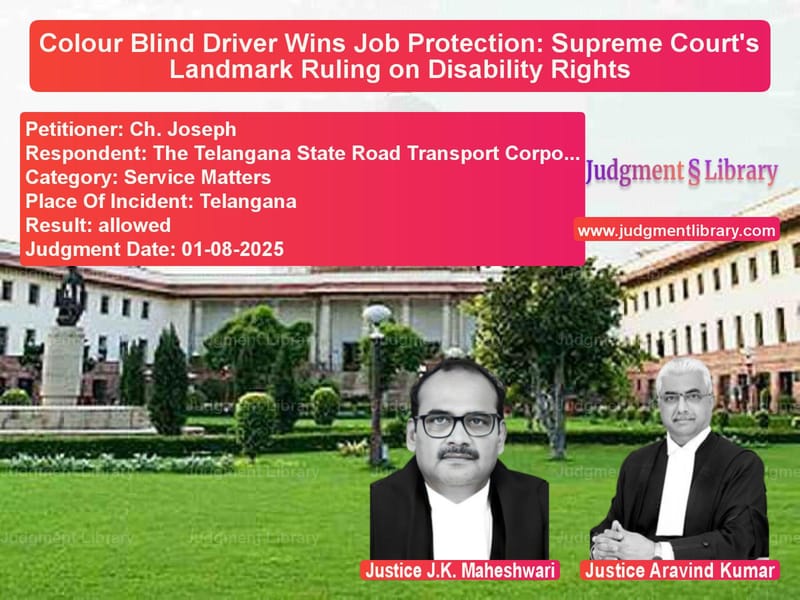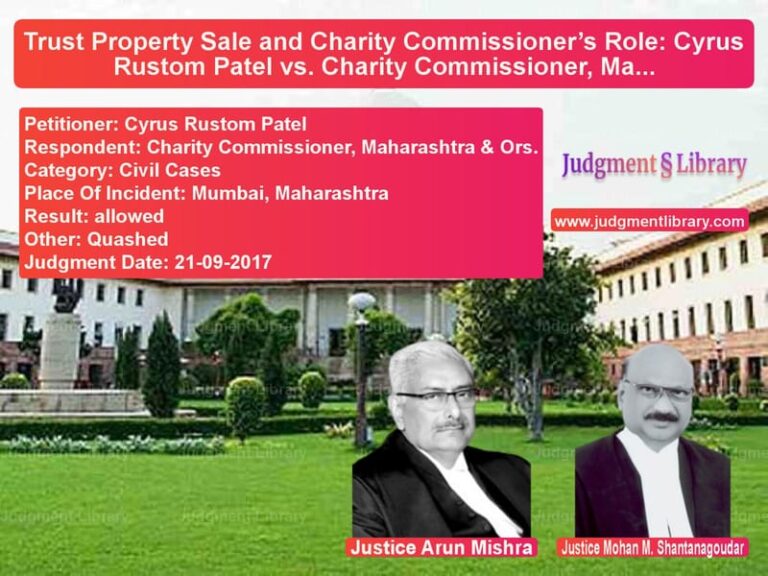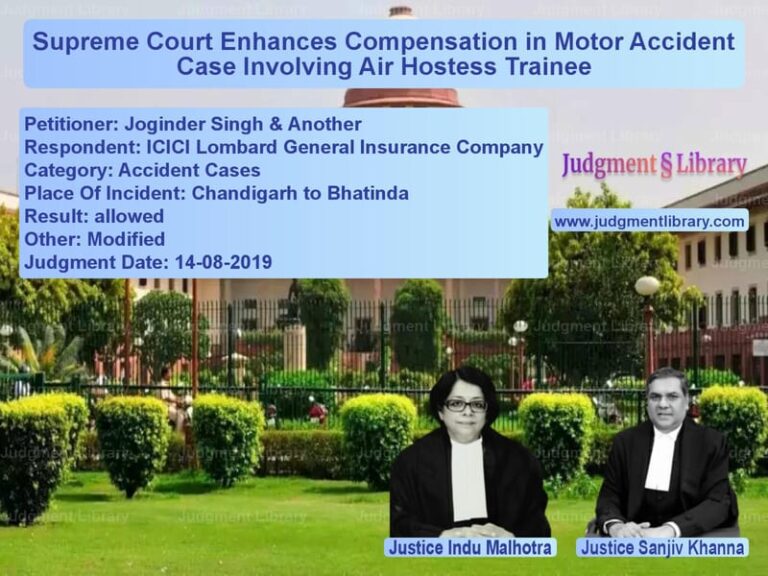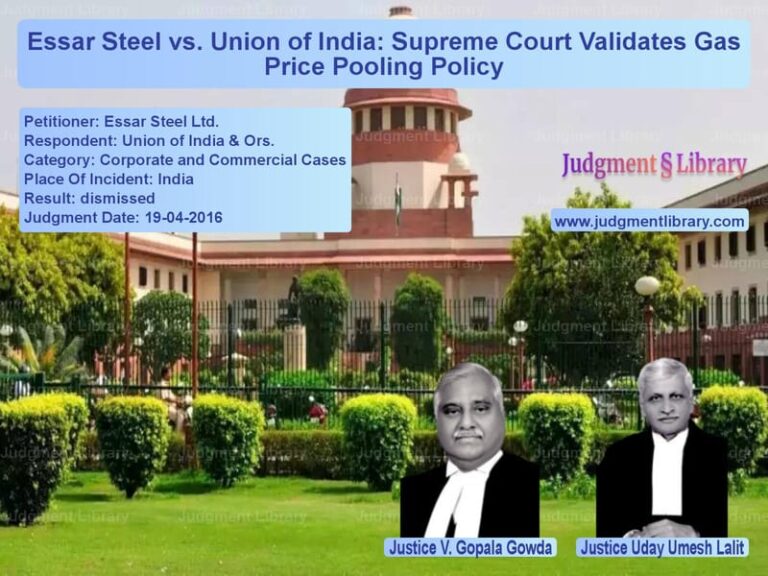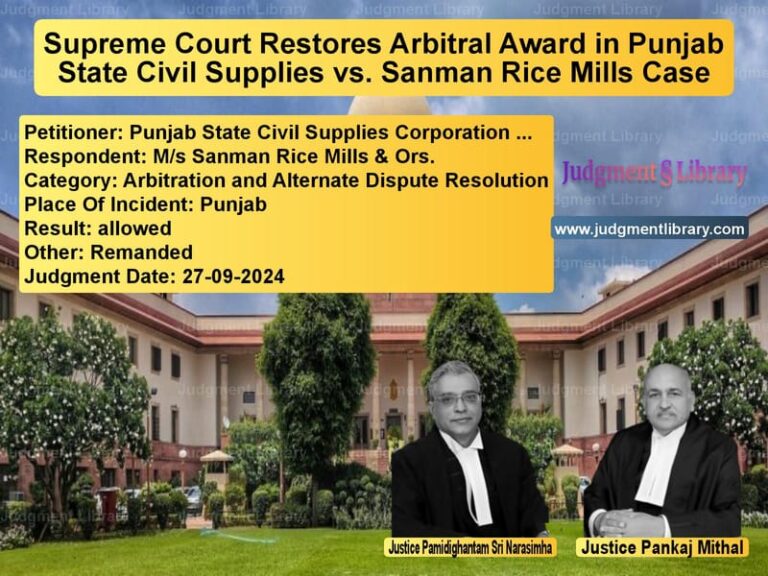Colour Blind Driver Wins Job Protection: Supreme Court’s Landmark Ruling on Disability Rights
In a landmark judgment that strengthens the rights of employees who acquire disabilities during service, the Supreme Court has ruled that a colour blind driver cannot be simply retired from service without being offered alternative employment. The case involved Ch. Joseph, who was appointed as a driver with the Telangana State Road Transport Corporation in 2014 and was later found to be colour blind during a routine medical examination.
The corporation retired Joseph from service in January 2016, offering him only additional monetary benefits instead of alternative employment. This decision sparked a legal battle that went through multiple judicial forums before reaching the Supreme Court, raising fundamental questions about employee rights, disability protection, and the binding nature of industrial settlements.
Mr. C. Mohan Rao, the learned Senior Advocate representing the appellant Joseph, made several compelling arguments. He contended that “the Memorandum of Settlement (MOS) entered between the APSRTC and the recognized unions u/s 12(3) of the Industrial Disputes Act,1947 dated 17.12.1979 is binding on the respondent-corporation and according to the same, the appellant herein being the ‘driver’ of the corporation is entitled for an alternate employment.” He further argued that “the High Court failed to appreciate that the case of the Appellant falls within the category of people who have acquired the disability during service and thus appellant would be entitled for alternate employment.”
The appellant’s counsel also relied on the principles established in Kunal Singh v. Union of India, which differentiated between disability of a person and acquired disability while in service. He emphasized that “appellant having acquired disability while in service is entitled to alternate employment” and that “the appellant herein is entitled to the benefit of Section 47 of the Act and therefore has the right to alternate employment.”
On the other side, Mr. Satyam Reddy Sarasani, Senior Advocate appearing for the respondent corporation, defended the termination decision. He argued that “MOS dated 17.12.1979 was replaced by the Memorandum of Settlement dated 22.12.1986, and the previous clause relating to alternate employment to the drivers came to be replaced by Clause 5(d).” This new clause stated that “Medically unfit driver- it is agreed that to the extent possible suitable alternative job will be identified. In case it is not possible to identify suitable jobs, additional monetary benefit as per the proposals sent to the Government will be given after Government’s approval.”
The corporation further contended that “as the appellant being an illiterate person and being a person without qualification, does not fall in the category of persons who can be given alternate employment” and that “the term ‘colour blindness’ does not fall under the category of ‘disability’ as defined under Section 2(i) of the Act and therefore Section 47 of the Act does not apply.” They also argued that “on the bare reading of the definition given in Section 2(i) it can be seen that, persons who have more than 40% of disability will fall into the category of ‘persons with disability’, and appellant’s case therefore does not fall in the category of ‘persons with disability’.”
The Supreme Court, in its comprehensive judgment, identified several critical legal issues and provided clear answers that have significant implications for employment law and disability rights in India.
The Court first examined whether the retirement of the appellant on medical grounds due to colour blindness, without offering alternative employment, was legally sustainable. The Court found that “the Appellant’s retirement from service on the ground of colour blindness was effected without any demonstrable effort by the Respondent–Corporation to identify or assess the feasibility of alternative employment, despite the Appellant having expressed willingness to be reassigned to a non-driving post. Such inaction violates both statutory obligation and administrative fairness.”
The Court emphasized that “the primary legal flaw in this approach lies in the assumption that medical unfitness for a particular post automatically entails incapacity for public service altogether. Colour blindness, though a disqualification for driving, does not render the Appellant unfit to serve in any other non-driving role.”
On the crucial issue of the Memorandum of Settlement, the Court held that “the Appellant’s entitlement to redeployment arises from Clause 14 of the binding Memorandum of Settlement dated 17.12.1979, executed under Section 12(3) of the Industrial Disputes Act, 1947, which specifically provides for alternate employment to drivers declared colour blind, with pay protection and continuity of service. This clause remains valid and enforceable.”
The Court specifically examined Clause 14 of the 1979 settlement, which stated: “The long pending issue has been decided and it was agreed to give alternate job to the Drivers found colour blind during the periodical examination. While giving the alternate job, the time scale and pay drawn by the Driver at the time of disqualification would be protected.”
The Court rejected the corporation’s argument that the 1979 settlement had been superseded, noting that “the subsequent settlement dated 22.12.1986 neither expressly overrides nor impliedly nullifies the 1979 settlement. Both settlements operate harmoniously, with the latter being general in scope and the former addressing a specific category of disability.”
The judgment made a significant distinction between statutory settlements and administrative instructions, stating that “internal circulars issued by the Corporation in 2014 and 2015, which purport to deny alternate employment to colour-blind drivers, are administrative instructions that cannot override binding service conditions created by a statutory settlement under the Industrial Disputes Act.”
The Court also addressed the corporation’s failure to assess alternative employment options, noting that “from the record, it is evident that the Corporation made no effort whatsoever to assess the feasibility of assigning the Appellant to a non-driving post. There is no file noting, committee report, vacancy statement, or suitability assessment relating to the Appellant.”
The Court emphasized that “the burden lies on the Corporation—not the employee—to establish that no suitable alternate post was available or could reasonably be created. Mere invocation of a medical certificate, or the silence of a circular, cannot constitute compliance. Inaction is not neutrality; in such cases, it is a form of institutional exclusion.”
In addressing the High Court’s reliance on the B.S. Reddy case, the Supreme Court found that “the Division Bench of the High Court erred in applying the judgment in B.S. Reddy (supra), which dealt with the limited scope of Section 47 of the Act, and did not consider claims arising independently under industrial settlements. The present case stands on an entirely different legal footing.”
The Court extensively discussed the broader legal framework governing employees who acquire disability during service, quoting from its earlier decision in Kunal Singh: “It must be remembered that a person does not acquire or suffer disability by choice. An employee, who acquires disability during his service, is sought to be protected under Section 47 of the Act specifically. Such employee, acquiring disability, if not protected, would not only suffer himself, but possibly all those who depend on him would also suffer. The very frame and contents of Section 47 clearly indicate its mandatory nature.”
The Court further elaborated on the constitutional dimensions of the case, stating that “the duty to reasonably accommodate such employees is not just a matter of administrative grace, but a constitutional and statutory imperative, rooted in the principles of non-discrimination, dignity, and equal treatment.”
In its concluding remarks, the Court made a powerful statement about the relationship between employers and employees: “While judicial restraint guards against overreach, it must not become an excuse for disengagement from injustice. When an employee is removed from service for a condition he did not choose, and where viable alternatives are ignored, the Court is not crossing a line by intervening, it is upholding one drawn by the Constitution itself. The employer’s discretion ends where the employee’s dignity begins.”
The Supreme Court allowed the appeal and set aside the High Court’s judgment. The Corporation was directed to appoint the appellant to a suitable post consistent with his condition, on the same pay grade as he held at the time of termination, within eight weeks. The appellant was also granted 25% of arrears of salary and benefits from the date of termination to reinstatement, with the intervening period reckoned as continuous service for all purposes.
This judgment represents a significant victory for employees who acquire disabilities during service and reinforces the principle that employers, particularly public sector entities, have an obligation to provide reasonable accommodation and alternative employment before resorting to termination. It strengthens the legal protection available to workers and emphasizes the constitutional values of dignity, equality, and social justice in employment relationships.
Petitioner Name: Ch. Joseph.Respondent Name: The Telangana State Road Transport Corporation & Other.Judgment By: Justice J.K. Maheshwari, Justice Aravind Kumar.Place Of Incident: Telangana.Judgment Date: 01-08-2025.Result: allowed.
Don’t miss out on the full details! Download the complete judgment in PDF format below and gain valuable insights instantly!
Download Judgment: ch.-joseph-vs-the-telangana-state-supreme-court-of-india-judgment-dated-01-08-2025.pdf
Directly Download Judgment: Directly download this Judgment
See all petitions in Employment Disputes
See all petitions in Termination Cases
See all petitions in Public Sector Employees
See all petitions in Judgment by J.K. Maheshwari
See all petitions in Judgment by Aravind Kumar
See all petitions in allowed
See all petitions in supreme court of India judgments August 2025
See all petitions in 2025 judgments
See all posts in Service Matters Category
See all allowed petitions in Service Matters Category
See all Dismissed petitions in Service Matters Category
See all partially allowed petitions in Service Matters Category

